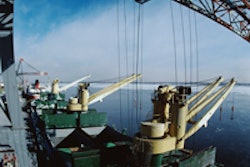Philadelphia — October 25, 2007 — Dr. Robert C. Lieb, professor of Supply Chain Management at Northeastern University, and Vincent Hartnett, president — Penske Logistics, unveiled the latest findings from an annual survey of CEOs of many of the world's largest third-party logistics providers the Council of Supply Chain Management Professionals Annual Conference in Philadelphia this week. The research study, conducted annually since 1994, was sponsored this year by Penske Logistics and looks at trends across three regions: North America, Europe and Asia-Pacific.
This summer, 40 CEOs — 21 from North America, nine from Europe and 10 from Asia-Pacific — responded to the survey. Findings indicate that while CEOs struggle to retain and attract new talent, face increased involvement from procurement during the selection process and are under pressure to lower prices while increasing service offerings, many are optimistic about global expansion opportunities and the overall prospect of growth for the industry.
Key insights into the opportunities and challenges facing 3PL providers include the following:
Revenue Growth
- CEOs are optimistic about growth prospects, with 87 percent of CEOs saying they exceeded or met company revenue growth projections in the past year.
- One-year industry revenue growth projections averaged 11.1 percent for North America, 7.5 percent for Europe, and 12.9 percent for Asia-Pacific. Additionally, three-year projections were 11.4 percent for North America, 9.7 percent for Europe and 12.6 percent for Asia-Pacific.
M&A and Private Equity
- 40 percent of CEOs reported that their companies were involved in M&A activity in the past year. This number was especially high in Asia, where six out of 10 CEOs reported that they had been involved in M&A.
- Acquisitions will continue to contribute to revenue growth. In Europe, for instance, CEOs project that 33 percent of their revenue growth over the next three years will come from M&A.
- CEOs were split on the growing involvement of private equity companies in the industry: 56 percent were optimistic about private equity involvement because of the infusion of capital, while the rest believe that their focus on short-term gain and financial returns, plus a lack of focus on the customer, is a negative development.
Expansion Abroad
- Logistics services and operations are migrating to emerging regions, specifically Mexico, Eastern Europe, Russia, China and India.
- CEOs anticipate strong demand for logistics services in Asia — the only region where some CEOs reported that the industry was "very profitable" — while at the same time Asia-based 3PLs are struggling to remain competitive with the emergence of large foreign-based competitors.
- Companies are finding new challenges when they expand abroad to emerging regions, specifically in the areas of the availability and quality of transportation, regulatory hurdles, real estate issues and staffing.
- Overall, CEOs reported continued customer pressure to offer integrated global service offerings.
Emergence of Lead Logistics Providers
- Interest continues to grow in the use of a Lead Logistics Provider (LLP). Demand is highest in Europe, where 77 percent of CEOs reported increased interest.
Talent Shortage
- Finding, training and retaining top talent continues to be one of the highest-ranked problems by CEOs.
- In North America, the largest percentage of CEOs indicated that they are implementing new recruitment, training and retention efforts. Of note, 95 percent of these CEOs indicated they are implementing new training programs.
Procurement Involvement
- 87 percent of survey respondents indicated procurement is more involved in the logistics provider selection process than before.
- Procurement's involvement is having an impact on the sales cycle according to 41 percent of respondents who reported a more lengthy process caused by their involvement.
Downward Pricing Pressures
- Combined with demands for more service for less, pricing pressures continue to plague the industry. Eighty-seven percent of the companies have taken steps to address those pressures, including: increased emphasis in value-selling, focusing on cost reduction as a means of improving margins, being more selective about what customers to work with, and developing more specific service menus which emphasize integrated solutions and high-margin value-added services.
Companies participating in the annual survey included: Cardinal Logistics, Caterpillar Logistics, CEVA, DHL, DSC Logistics, Genco, Geodis, Kuehne & Nagel, Landstar, Menlo Logistics, Modus Link, NYK Logistics, Panalpina, Penske Logistics, Pittsburgh Logistics, Ryder Logistics, Schneider Logistics, TNT, Transplace, UPS, UTI and YRC Logistics.



















